
Robert Devereux, 2nd Earl of Essex, KG, PC was an English nobleman and a favourite of Queen Elizabeth I. Politically ambitious, and a committed general, he was placed under house arrest following a poor campaign in Ireland during the Nine Years' War in 1599. In 1601, he led an abortive coup d'état against the government of Elizabeth I and was executed for treason.

Henry Rich, 1st Earl of Holland, was an English courtier and politician executed by Parliament after being captured fighting for the Royalists during the Second English Civil War. Younger brother of Robert Rich, 2nd Earl of Warwick, a Puritan activist and commander of the Parliamentarian navy during the Wars of the Three Kingdoms, Henry was better known as an "extravagant, decorative, quarrelsome and highly successful courtier".
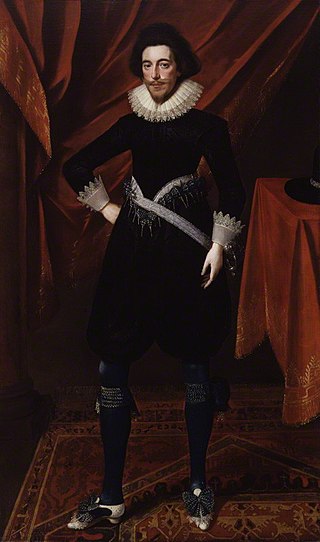
Robert Devereux, 3rd Earl of Essex, KB, PC was an English Parliamentarian and soldier during the first half of the 17th century. With the start of the Civil War in 1642, he became the first Captain-General and Chief Commander of the Parliamentarian army, also known as the Roundheads. However, he was unable and unwilling to score a decisive blow against the Royalist army of King Charles I. He was eventually overshadowed by the ascendancy of Oliver Cromwell and Thomas Fairfax, and resigned his commission in 1646.
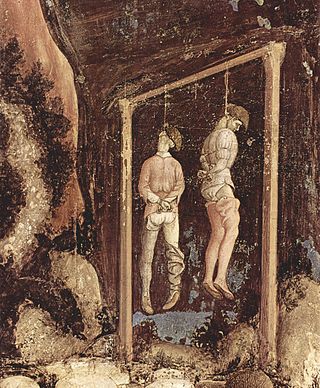
Hanging is killing a person by suspending them from the neck with a noose or ligature. Hanging has been a common method of capital punishment since the Middle Ages, and is the primary execution method in numerous countries and regions. The first known account of execution by hanging is in Homer's Odyssey. Hanging is also a method of suicide.

Albert Pierrepoint was an English hangman who executed between 435 and 600 people in a 25-year career that ended in 1956. His father Henry and uncle Thomas were official hangmen before him.

Robert Carr, 1st Earl of Somerset, was a politician, and favourite of King James VI and I.
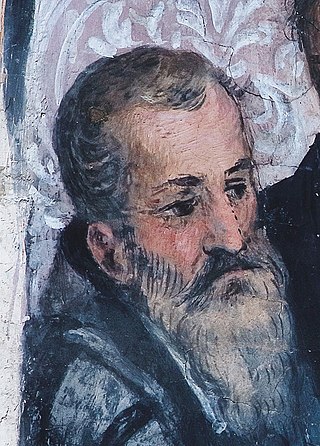
Hugh O'Neill, was an Irish Gaelic lord, Earl of Tyrone and was later created The Ó Néill Mór, Chief of the Name. O'Neill's career was played out against the background of the Tudor conquest of Ireland, and he is best known for leading a coalition of Irish clans during the Nine Years' War, the strongest threat to the House of Tudor in Ireland since the uprising of Silken Thomas against King Henry VIII.
Geoffrey de Mandeville II, 1st Earl of Essex was a prominent figure during the reign of King Stephen of England. His biographer, the 19th-century historian J. H. Round, called him "the most perfect and typical presentment of the feudal and anarchic spirit that stamps the reign of Stephen". That characterisation has been disputed since the later 20th century.

Richard Brandon was the common executioner of London from 1639 to 1649, who inherited his role from his father Gregory Brandon and was sometimes known as Young Gregory. Richard Brandon is often named as the executioner of Charles I, though the executioner's identity is not definitely known.

Sir John Harington, of Kelston, Somerset, England, but baptised in London, was an English courtier, author and translator popularly known as the inventor of the flush toilet. He became prominent at Queen Elizabeth I's court, and was known as her "saucy Godson", but his poetry and other writings caused him to fall in and out of favour with the Queen. He was the author of the description of a flush-toilet forerunner installed in his Kelston house appears in A New Discourse of a Stale Subject, called the Metamorphosis of Ajax (1596), a political allegory and coded attack on the monarchy, which is nowadays his best-known work.
Henry Brooke was an Irish novelist and dramatist. He was born and raised at Rantavan House near Mullagh, a village in the far south of County Cavan in Ireland, the son of a clergyman, and he later studied law at Trinity College, Dublin, but embraced literature as a career.
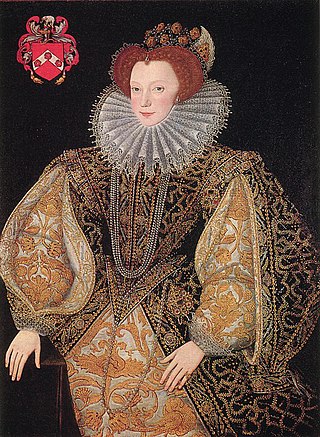
Lettice Knollys, Countess of Essex and Countess of Leicester, was an English noblewoman and mother to the courtiers Robert Devereux, 2nd Earl of Essex, and Lady Penelope Rich. By her second marriage to Elizabeth I's favourite, Robert Dudley, Earl of Leicester, she incurred the Queen's unrelenting displeasure.

Ulick MacRichard Burke, 1st Marquess of Clanricarde, 5th Earl of Clanricarde, 2nd Earl of St Albans, was an Anglo-Irish nobleman who was involved in the Wars of the Three Kingdoms. A Catholic Royalist who had overall command of the Irish forces during the later stages of the Cromwellian conquest of Ireland, he was created Marquess of Clanricarde (1646).

Roderigo Lopes served as a physician-in-chief to Queen Elizabeth I of England from 1581 until his death by execution, having been found guilty of plotting to poison her. A Portuguese converso or New Christian of Jewish ancestry, he is the only royal doctor in English history to have been executed, and may have inspired the character of Shylock in Shakespeare's The Merchant of Venice, which was written within four years of his death.
Sir Henry Cuffe was an English writer and politician, executed during the reign of Queen Elizabeth I of England, for treason.
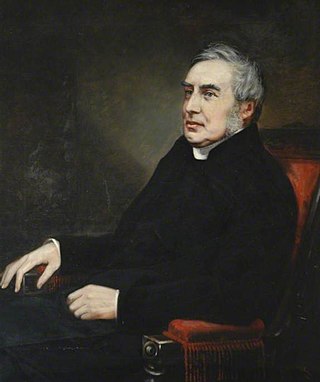
Charles Thomas Baring was an English bishop, noted as an Evangelical.
John Ryder (1562–1632) was a lexicographer who published an English-Latin Dictionary that was widely used in the 17th century. A favourite of Elizabeth I, he was Dean of St. Patrick's Cathedral, Dublin, and the Anglican Bishop of Killaloe.
Sir Nathaniel Rich (1585–1636) was an English merchant adventurer and politician who sat in the House of Commons at various times between 1614 and 1629.

Robert Bourchier, 1st Baron Bourchier was Lord Chancellor of England, the first layman to hold the post.

Essex's Rebellion was an unsuccessful rebellion led by Robert Devereux, 2nd Earl of Essex, in 1601 against Queen Elizabeth I of England and the court faction led by Sir Robert Cecil to gain further influence at court.













